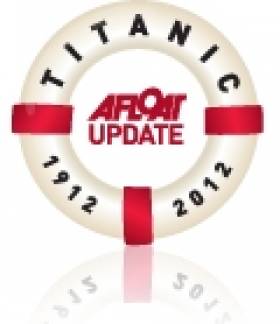Displaying items by tag: Mariners Church
Maritime Institute's Museum to Host 'Titanic Centenary' Presentation
#TITANIC-The Maritime Institute of Ireland is to hold a 'Titanic Centenary' event in their maritime museum, Dun Laoghaire on Thursday 12th April (starting at 8pm) noting doors open from 7.30pm.
The first Irish diver to see the wreck from a Russian MIR submersible, Rory Golden will provide an illustrated talk on the latest revelations through an audio-visual presentation. Golden's first Titanic experience was on an expedition in 2000, which yielded hundreds of artefacts.
To ensure a place of the ticketed event, bookings can be made from Linda from the maritime museum's shop Tel: 01 214 3964 (on the top floor of the Dun Laoghaire Shopping Centre) as the museum itself is not due to re-open until early April as previously reported on Afloat.ie.
Alternatively tickets can be booked at Costello Jewellers, 1 Northumberland Avenue, Dun Laoghaire Tel: 01 230 2311 (messages) and Barney Yourell, Lectures Officer of the institute by calling Mob: 087 900 7466. Tickets cost €10 each and concessions for senior citizens and unwaged etc are priced at €5. For further information contact Mob: 086 074 5402 and by visiting www.mariner.ie
'Bag' that Maritime Museum
A 'Bag-Packing Day' in aid of the Maritime Museum in Dun Laoghaire is to start tomorrow, writes Jehan Ashmore.
The fund-raising activity will also run on the Friday and Saturday at the Tesco Bloomfield Shopping Centre off Lower Georges Street.
Volunteers are invited to assist in providing two hours of their time to help raise funds for the Maritime Museum which is currently closed due to ongoing renovation work.
For further information please call (01) 214 3964 or email: [email protected]
The museum is located in the former Mariners Church and is run by the Maritime Institute of Ireland (M.I.I.). The museum is to be officially reopened in March 2012, however they intend to be open to the public before their 70th anniversary in October 2011.
Information about the M.I.I. and the museum which welcomes new members can be found on www.mariner.ie
Maritime Museum Needs You!
The Maritime Institute of Ireland (M.I.I.) is looking for volunteers to assist in the running of the maritime museum, located in the former Mariners' Church in Dun Laoghaire, Co. Dublin.
A Volunteers Induction Meeting is to be held on 15 February at 8 p.m. in the Dun Laoghaire Club. Please register in advance. For further details click this link.
In addition to the various roles and activities required in the operation of the museum, the institute, are looking for people who can assist from time to time with the setting up of special exhibitions, the making of DVDS to go with displays and website maintenance.
For general information and other updates about the museum log on to www.mariner.ie
Maritime Museum Seeks Volunteers
Over the last three years the museum has been closed for major restoration to the historic building which in fact is the greatest artefact on display. The museum is believed to contain the largest maritime collection of artefacts in Ireland.
For further details please contact Breasal O Caollai, Hon. Secretary Mob: 086-0745402 Email [email protected] and www.mariner.ie
AGM of the Maritime Institute of Ireland
The Maritime Institute of Ireland, a registered charity, is run by volunteers that represents maritime interests and organises a winter lecture series mostly held in Dublin
city-centre.
In addition the M.I.I. has a museum and a library in the Mariners Church, Dun Laoghaire.For several years the premises has remained closed due to extensive renovation, it is
intended to re-open in Easter 2011. For information on the M.I.I. www.mariner.ie



























































